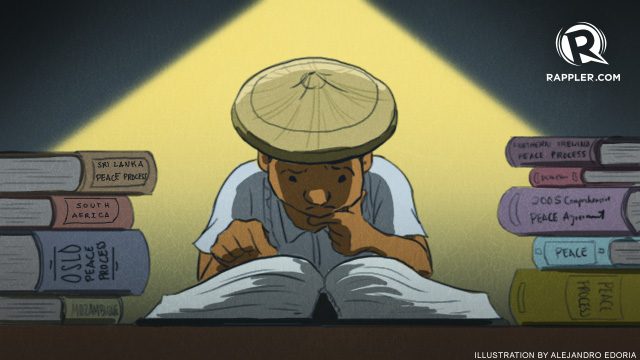SUMMARY
This is AI generated summarization, which may have errors. For context, always refer to the full article.
 The Philippines stands at a critical juncture.
The Philippines stands at a critical juncture.
The House of Representatives had just finished deliberating on the proposed Bangsamoro Basic Law (BBL), and its passage will be a critical milestone in the implementation of the Comprehensive Agreement on the Bangsamoro (CAB), signed between the Government of the Philippines and the Moro Islamic Liberation Front (MILF) on March 27, 2014.
Congress’ decision will greatly influence the ultimate trajectory of the peace process. An important question to therefore ask, and one which should inform the Congress’ deliberations, is: What will the failure or success of the Bangsamoro peace process mean for the country?
Failed peace processes have consequences. While each peace process is unique, experiences from other countries that have witnessed violent conflict offer important insights. (TIMELINE: The long road to the Bangsamoro region)
Lessons from other countries

Given the amount of effort that has gone into building the trust required to bring the parties to the negotiation table in the first place, failure could lead to renewed violence that is worse than before. Violated trust leads to bitterness. In some situations where peace processes have failed after long negotiations, violent conflict has resumed with greater intensity.
The failure of Sri Lanka’s peace process in mid-2000 led to a military campaign by the government that ended the insurgency, but at the cost of 40,000 civilian lives. Economic and social scars in the country remain to this day. The military solution was unable to resolve the underlying grievances and social tensions in the country.
Similarly, more Israelis and Palestinian civilians have been killed in repeated cycles of violence since the Oslo peace process collapsed in 2000, than in the previous three decades of Israeli-Palestinian conflict. Even where war does not immediately resume, failure to implement peace agreements can lead to prolonged instability, retard development, and hold back foreign investment.
On the other hand, the successful implementation of peace agreements brings significant peace dividends.
Before the Ebola outbreak, Liberia’s economy was growing at 11% per annum. Against the backdrop of a very violent transition, successful national dialogue led South Africa back from the brink of civil war in 1994. It now has one of Africa’s most advanced economies.
Closer to the Philippines, with the successful implementation of the peace deal between the Indonesian government and GAM, Aceh has gone from being the site of a long-running insurgency to being a source of economic and political innovation for itself and for Indonesia.
In Mozambique, the peace negotiated in the early 1990s has held, except for a brief return to violence between 2013 and 2014. As part of a peace dividend, Mozambique has experienced growth at an average annual rate of 7%.
The people of Northern Ireland are finally living in peace with each other and with the rest of the United Kingdom, after several decades of constant fear of bomb attacks on the way to office or school.
It is noteworthy that several of these successful peace processes experienced downturns, ceasefire violations, attempts to undermine the peace process, and even brief periods of resumption of major violence. Yet, the parties remained ultimately committed to a lasting and sustainable peace and continued implementation despite temporary crises.
Sustainable peace
The implementation of peace accords is also one key explanation behind sustainable peace.
A study of 83 peace agreements signed by governments and one or more rebel groups in internal armed conflicts, based on information from the Uppsala Conflict Data Program (UCPD), shows that when peace agreements—and especially those provisions related to the transition from a military presence to civilian security, and to autonomy or the governance of a particular territory—are implemented, peace is more likely to prevail.
Implementation of these provisions in particular serves as a signal of benign intentions, and can thereby help to create trust.
In December 2013, the newest country in the world, South Sudan, returned to full-fledged civil war. The renewed conflict had its origin in failure to implement key parts of the 2005 Comprehensive Peace Agreement. This failure caused a crisis of governance, where political power sat with a narrow political elite at the expense of the genuine empowerment for the country’s peoples.
The humanitarian consequences are devastating: it is estimated that the violence, in less than a year and half, has claimed 100,000 lives and displaced over 1.6 million. Despite repeated international efforts, the parties have failed to find a solution to end the violence.
As they make their decisions, the lawmakers of the Philippines could take note of the lessons from peace processes that have succeeded as well as those that have failed. The main lesson is that the costs of failed peace processes are unescapably and significantly higher than those required to make existing agreements work.
Here, the Philippines can learn from its own recent history. The perceived failure of the 1996 peace agreement between the Government and the MILF partly drove the latter’s insurgency. It was nearly two decades before a new agreement could be reached.
The current peace process did not stop with the signing of the CAB. A crucial step was left to the Philippines Congress, which now has the historic role and responsibility of being the maker and keeper of sustainable peace. – Rappler.com
Kristine Höglund is a professor in the Department of Peace and Conflict Research, Uppsala University, Sweden. She has specialized in the inter-linkages between conflict resolution and violence.
Isak Svensson is an Associate Professor in the Department of Peace and Conflict Research at Sweden’s Uppsala University and the author of many publications on mediation and peace negotiations.
Add a comment
How does this make you feel?
There are no comments yet. Add your comment to start the conversation.